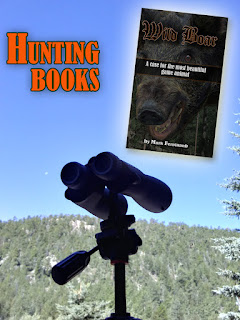Monday, November 11, 2019
Thursday, August 1, 2019
Wild Hog Books
Wild Hog Books
Mark Ferdinand has written a
fantastic book on wild hog hunting. Wild hog books can be hard to find
at the local book shop, or are tucked away in miscategorized sections .
This book is available in paperback through Amazon, and digital formats are available for every platform.
Wild Boar: A Case for the Most Beautiful Game Animal
This book is a profile of the
hunting of wild hogs, from the ancient European traditions to the modern
necessity to keep wild hog populations down in the USA. The author
looks back fondly on his exposure to wild boar in Germany, then brings
his passion to achieve his first wild boar kill on a California boar.
Several books about wild hogs and hunting exist. Mark’s book, however, adds a touch of history, tradition, and whimsy. It makes for a great distraction when waiting for the next hunting season to arrive!
The consistent backdrop of each hunting scene was the greenery of the surrounding forest. Having visited the Black Forest of Bavaria before this day, I had experienced the darkness it was capable of. Unlike the forests of Colorado where I had grown up, these had a foreboding quality to them. They evoked not a sense of fear necessarily, but a feeling of awe, a cautionary respect for the potential for a young person to be swallowed up and lost in the darkness.
Mark Ferdinand is the author of “Fortune on the Spectrum”, “You’re Gonna’ Get Bit!” “Every Tiki has a Spirit”, and “The Autistic Prankster”.
Thursday, May 30, 2019
Autism and Eye Contact
Autism and Eye Contact
Most people take for granted the role eye contact plays with social interaction. To the child on the autism spectrum, however, the value or understanding of eye contact may prove elusive. It is a factor that has an interesting effect on the lives of children and families.
One of the first warning signs that can alert parents to the possible presence of autism is poor eye contact. This is of particular concern for young children after 2 years of age. The first instinct of many parents is to presume that the child has a hearing problem. The child may not respond to his name until after several attempts. Following an autism diagnosis, parents come to understand how eye contact is used or avoided by the child.
 |
| Eye Contact |
Eye contact, among other factors, also comes into play as the child gets older. Other children will be encountered at a park, school or public event. The typically developing child that approaches the autistic child in an attempt to make friends is likely to feel snubbed. This occurs through a combination of eye contact avoidance and little or no verbal response from the autistic child.
Parents and therapists will need to develop eye contact skills the best way they can. This can be through motivational or reward techniques. The child may eventually learn to equate speaking with eye contact and respond accordingly. This of course depends on the severity of the case of autism and traits of the individual child.
In the case of my son, his eye contact has improved greatly over the years. Regardless of improvements, there most likely will always be certain moments that he resists eye contact. It is simply an uncomfortable thing for him to do at times. Ultimately the goal will be for him not to enjoy eye contact, but to use it as a life skill when social situations arise.
Autism themed books by Mark Ferdinand. Fiction and nonfiction:
Fortune on the Spectrum
Denny
was diagnosed with autism at three years of age. Autism gave him the
gift of obsession. This gift made him the youngest, self-made
millionaire in Texas history. Autism also made him vulnerable to the
forces of the outside world, of both society and nature. Fortune on the
Spectrum is the journey of an unstoppable young man, destined to
succeed and challenged to survive. Denny's story takes you through
struggle, humor, love, finance and danger from the voice of an atypical
mind. Autism Fiction. Texas Novel.
The Autistic Prankster: Enjoying the Fun Side of Autism
We
know about all the challenges. These stories focus on the fun and the
funny side of autism. While he may not have typical communication
skills, surprisingly this can be an asset in the humor department. Funny
autism-related moments are a daily occurrence with this young
character, and this book is a collection of the most memorable.
Books by Mark Ferdinand
- Fortune on the Spectrum –An Adventure Novel
- You’re Gonna’ Get Bit! –Harrowing Tales of Herpetology
- The Autistic Prankster –Enjoying the Fun Side of Autism
- Every Tiki has a Spirit
- Wild Boar: A Case for the Most Beautiful Game Animal
Friday, May 17, 2019
Echolalia and Autism
Echolalia
Echolalia is the involuntary repetition of words or phrases spoken by others or heard through some type of medium. Echolalia is a phenomenon that is common among children with autism. While the typically developing child develops speech through imitation, these imitations quickly evolve into creative use of words to form language. For the child with autism and echolalic traits, this process may take much longer if it even happens at all.Echolalia can be either immediate or delayed. In the case of immediate echolalia, the child repeats what is heard from others immediately. For example, the parent may ask, ‘How was school today?’ and the child repeats ‘How was school today'? In the case of delayed echolalia the child is repeating phrases he has been exposed to after hours, days, months or even years. For example, a child may repeat a phrase from a commercial that he finds interesting.
 |
A different
form of communication
|
Many children with echolalic traits are fortunate to have them in comparison to those on the severe end of the autism spectrum. Echolalia can sometimes be a foundation for the ability to develop functional communication later in life. While these expressions may not make sense to most people, parents learn that it is still communication and need to adapt to its nuances. Over time they end up interpreting each phrase and the motivation and emotions associated with it.
Autism themed books by Mark Ferdinand. Fiction and nonfiction:
Fortune on the Spectrum
Denny
was diagnosed with autism at three years of age. Autism gave him the
gift of obsession. This gift made him the youngest, self-made
millionaire in Texas history. Autism also made him vulnerable to the
forces of the outside world, of both society and nature. Fortune on the
Spectrum is the journey of an unstoppable young man, destined to
succeed and challenged to survive. Denny's story takes you through
struggle, humor, love, finance and danger from the voice of an atypical
mind. Autism Fiction. Texas Novel.
The Autistic Prankster: Enjoying the Fun Side of Autism
We
know about all the challenges. These stories focus on the fun and the
funny side of autism. While he may not have typical communication
skills, surprisingly this can be an asset in the humor department. Funny
autism-related moments are a daily occurrence with this young
character, and this book is a collection of the most memorable.
Books by Mark Ferdinand
- Fortune on the Spectrum –An Adventure Novel
- You’re Gonna’ Get Bit! –Harrowing Tales of Herpetology
- The Autistic Prankster –Enjoying the Fun Side of Autism
- Every Tiki has a Spirit
- Wild Boar: A Case for the Most Beautiful Game Animal
Subscribe to:
Comments (Atom)





